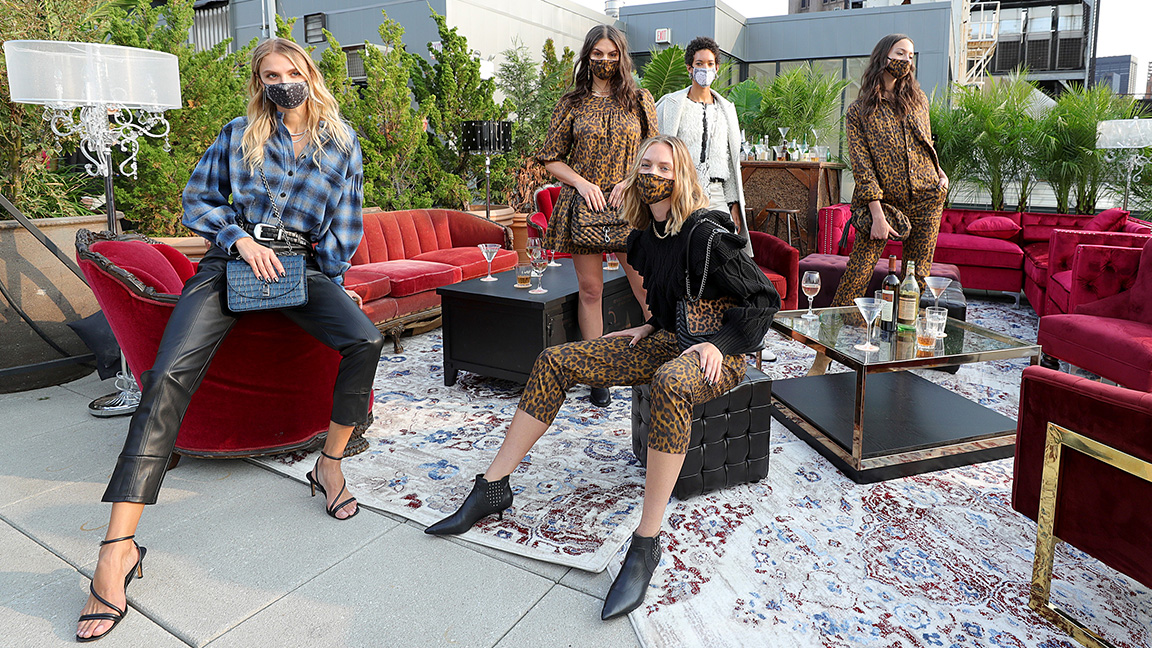
We’re in the middle of fashion week season: New York’s and London’s have wrapped up, Milan’s is going on right now and Paris’ will round out the sequence next week.
The runway shows have been scaled back, socially distanced and mostly virtual. The slimmed-down events are one indication of how the fashion industry’s scrambling to make sense of a world under lockdown.
In the program for his New York Fashion Week event, designer Tom Ford wrote that at the height of stay-at-home orders, he felt fashion should simply go into hibernation for a year. He’s not alone in that thought. Susan Scafidi, founder and academic director at the Fashion Law Institute at Fordham University, said these fashion week shows are “in some ways a placeholder.”
“At the moment, the way we dress is really the way we don’t dress anymore, Scafidi said. “Fewer places to go, fewer formal events, a significant percentage of people still working from home.”
She said that means designers and the companies that distribute clothes have to evolve.
Last week, Rent the Runway, known for leasing workwear and formal wear, said it is getting rid of its unlimited subscription. Retailers that sell high fashion have shuttered. Supply chains have been backed up. Thomai Serdari, luxury marketing professor at New York University, says there’s “a general feeling of uncertainty.”
“We don’t know where we’re going to manufacture the product, we don’t know what the product will look like. We don’t know what our life would look like to even imagine the product,” Sedari said.
The products for now on the virtual runway: couture masks, flowier, comfier clothes and home decor. Laticha Brown, a professor at Fashion Institute of Technology, said designers are using this time to rethink what they want to create and what consumers will buy. Brown said her own style has changed now that she spends lots of time on video calls.
“I’m looking at neckline, so am I wearing a crewneck or V-neck,” she said. “I want to make sure perhaps my necklace is a statement necklace something that they can actually see.”
That’s influencing what she and other shoppers have been buying.
What does the unemployment picture look like?
It depends on where you live. The national unemployment rate has fallen from nearly 15% in April down to 8.4% percent last month. That number, however, masks some big differences in how states are recovering from the huge job losses resulting from the pandemic. Nevada, Hawaii, California and New York have unemployment rates ranging from 11% to more than 13%. Unemployment rates in Idaho, Nebraska, South Dakota and Vermont have now fallen below 5%.
Will it work to fine people who refuse to wear a mask?
Travelers in the New York City transit system are subject to $50 fines for not wearing masks. It’s one of many jurisdictions imposing financial penalties: It’s $220 in Singapore, $130 in the United Kingdom and a whopping $400 in Glendale, California. And losses loom larger than gains, behavioral scientists say. So that principle suggests that for policymakers trying to nudge people’s public behavior, it may be better to take away than to give.
How are restaurants recovering?
Nearly 100,000 restaurants are closed either permanently or for the long term — nearly 1 in 6, according to a new survey by the National Restaurant Association. Almost 4.5 million jobs still haven’t come back. Some restaurants have been able to get by on innovation, focusing on delivery, selling meal or cocktail kits, dining outside — though that option that will disappear in northern states as temperatures fall. But however you slice it, one analyst said, the United States will end the year with fewer restaurants than it began with. And it’s the larger chains that are more likely to survive.
As a nonprofit news organization, our future depends on listeners like you who believe in the power of public service journalism.
Your investment in Marketplace helps us remain paywall-free and ensures everyone has access to trustworthy, unbiased news and information, regardless of their ability to pay.
Donate today — in any amount — to become a Marketplace Investor. Now more than ever, your commitment makes a difference.
tinyurlis.gdv.gdv.htclck.ruulvis.netshrtco.detny.im
مقالات مشابه
- مرکز توزیع سیمان سفید کرمان
- اتریوم چیست و قیمت اتریوم چقدر است؟
- کوچک کسب و کار چینی زنده COVID-19 shutdown. در حال حاضر چه ؟
- برق خودرو سازان افزایش در خوش بینی سرمایه گذاران
- نقشه راه گام به گام جدید برای بالش بادی
- نرخ وام مسکن امروز 2 ژوئن 2020 به علاوه قفل توصیه
- چین قراضه تولید ناخالص داخلی هدف در بار اقتصادی, اما برخی از اصلاح طلبان تشویق
- مصرف کننده گزارش مدیر عامل در مبارزه برای حمایت از ما در جهان آنلاین
- دکانتور شیشه ای چیست ؟
- Mortgage and refinance rates today, September 9, 2020